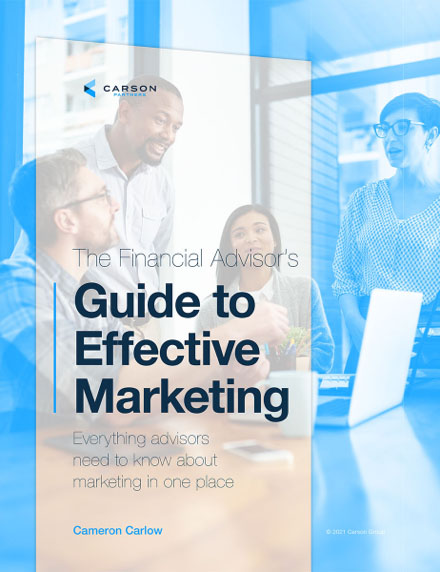Recently, I took my children on a trip to our local library. Among the stack of books they eagerly checked out was an old favorite of mine — a “Choose Your Own Adventure” novel, where you, the reader, get to take on the role of the main character. Each short chapter is concluded with a choice: Do you take Path A to page 8 or Path B to page 12? Will you explore the cave or climb the mountain?
As I was reading with my kids (Dad win!), I realized something profound. While the possible outcomes of these books are numerous, the first decision you make sets the tone for your entire journey. That one, specific choice begins a butterfly effect that causes and colors all subsequent choices.
As a financial advisor, you also have one, specific choice to make that will affect every other part of your practice: Are you serving or selling?
Sure, the lines can become blurred and the two are rarely mutually exclusive, but at the core of your business, which of these two actions is your primary focus: helping others or helping yourself? Your ability to assist clients in pursuing their financial goals is strengthened by one and undermined by the other.
The Truth About Sales
Ask anyone walking down the street what words they associate with “salespeople” and you’re likely to receive a list of adjectives that are less than flattering. Too many negative, commission-driven experiences have everyday consumers feeling like sales professionals see them only as fish in a barrel. The sale is king and the customer is the joker.
But, the truth of the matter is this: Sales isn’t inherently immoral or even bad.
Michael Kitces of Nerd’s Eye View says the career track from salesperson to advisor was largely the norm up until recently. In an episode of #OfficeHours, he described this path:
The original financial advisor career track was actually pretty simple. It was a sales job. You came in, you sold products… When you hear anybody talk about “the good old days” when companies trained you, they didn’t train you on how to be a financial planner. They trained you in how to sell and prospect…If you were good at sales and prospecting, you were a survivor. And then later, maybe you got training in how to become a financial planner and get your CFP®. Even then, usually, you would go get your CFP® because it just taught you more about how to ask probing questions and do needs-based selling so that you could sell more products.
Today, some financial services companies still operate this way. You earn your way to professional designations by first proving yourself as a producer, sometimes cold-calling and door-to-dooring your way up the ladder. An article from Financial Planning in 2016 titled “Are You a Salesperson or a Professional Planner” explains:
After all, the center of gravity in this profession seems to be dually registered reps who, based on the BD surveys conducted by this magazine and others, generate roughly 65% of their revenue from sales commissions…Salespeople are not evil, or wrong — they just aren’t the future of the planning profession. In order to go beyond being just a salesperson, you’ll need to change your service and compensation model.
And, there it is, sales is not the future of the planning profession.
A Conflict of Interest and Intent
I’m going to make a blanketed assumption that most advisors enter into this line of work because they truly want to help people. It is their intention to use their education and God-given abilities to inspire others to make sound financial decisions. Maybe that’s a naïve, rose-colored view of financial planning, but from personal experience with the Carson Group Partners and coaching members I’ve met, it seems to be the driving force behind most who stick around in this industry.
It then becomes a conflict of intent when the company you work for makes their agenda more important than the people you are trying to serve. A November 2017 article from InvestmentNews titled “Why Wirehouse Advisors Shouldn’t Fear Going Independent” explains the reality of client relationships in this space:
But these advisors were also compelled to work only with ultra-high-net-worth clients (i.e., in the $50 million range), leading them to turn away many clients who could potentially benefit from their services. In each conversation, one thing was clear: the wirehouse model seemed to place shareholders first, executives second, middle management third . . . and clients last. This corporate attitude became stifling to these advisors, even toxic. And they dreamed of an environment where the client could come first—and where they could build their firms on their own terms.
Plenty of wirehouse advisors out there are good people doing good things for their clients. In a culture dominated by sales commissions, company perks and widely-circulated rankings, however, can they consistently do what’s best for their clients?
It becomes a significant conflict of interest when truly unbiased advice takes a backseat to the quotas that seal your paycheck and your fate. Take, for example, the fake account scandals which have rocked Wells Fargo this year. An article published in Yahoo Finance this past July claims:
Indeed, Wells makes a point of saying that product sales goals are gone — for its branch bankers… But in the upper echelon of a different division of Wells Fargo — its Wealth and Investment Management division — the intense pressure for sales is alive and well, according to hundreds of pages of internal documents reviewed by Yahoo Finance, and interviews with four former employees in that division. In fact, even as Wells was de-emphasizing sales goals within its community bank, the pressure on its wealth managers was being turned up.
The combination of being unable to help the hardworking men and women they originally envisioned as their clients and being held to ever-growing sales expectations has many advisors leaving wirehouses to pursue more client-centric roles.
Carson Group Offers Options for Newly Independent Advisors
Leaving the wirehouse model is not a decision to take lightly, as going “rogue” can be fraught with uncertainties. Worries about client loyalty, creating a business structure from scratch and finding the support — technological and otherwise — needed to run a firm are very real.
But, for the brave, these concerns are far less frightening than the prospect of never fully realizing their purpose – an existence where you can align your values with the advice you give.
Carson Group can be a valuable resource during this transition. Our coaching program focuses on practice management and implementation. The Executive Business Coaches on our team work as accountability partners, using their expertise to guide advisors who are adjusting to the duality of being a wealth manager and a CEO.
The best practices they suggest are based on independent research and hundreds of hours speaking with other professionals who are excelling in our field. They then help members recreate this success at a size and scale that is relative to their firm.
For those who still want to outsource investment management, marketing and compliance, Partnership makes more sense. We handle the day-to-day tasks that consume a great deal of an independent advisor’s time, ultimately allowing you to concentrate your efforts on the areas you enjoy most, i.e. nurturing existing client relationships and prospecting.
A survey of our Partner advisors taken at the end of 2017 showed they gained a 32.7% increase in their love of the business and have 37% more time in their day than they had prior to joining.
No matter which Carson Group solution is right for the advisor, both are strengthened by a promise to start with the client’s interest and work backwards from there. Our Cultural Creed dictates:
Every decision we make as an organization can be traced back to the benefit of our clients. Their perceptions are our reality. Their preferences and opinions become our innovative roadmap and give our growth direction. We’re driven by taking a practitioner’s perspective. We have a finger on the pulse of our clients’ lives because there’s no better way to learn and grow than by walking a mile in someone else’s shoes.
Choose a New Adventure
Real life is far from a “Choose Your Own Adventure” novel. Although the journey you are on now is a result of that first choice you made — sales vs. service — it doesn’t have to remain that way. The beauty is that you can hit restart and create a different destiny, if you so choose. It’s all about what is going to fulfill you as an advisor.
As Ron likes to say: You don’t want to get to the end of your life and look back thinking “I wish I had…” instead of “I’m glad I did…” With that in mind, is it time for a new adventure?




